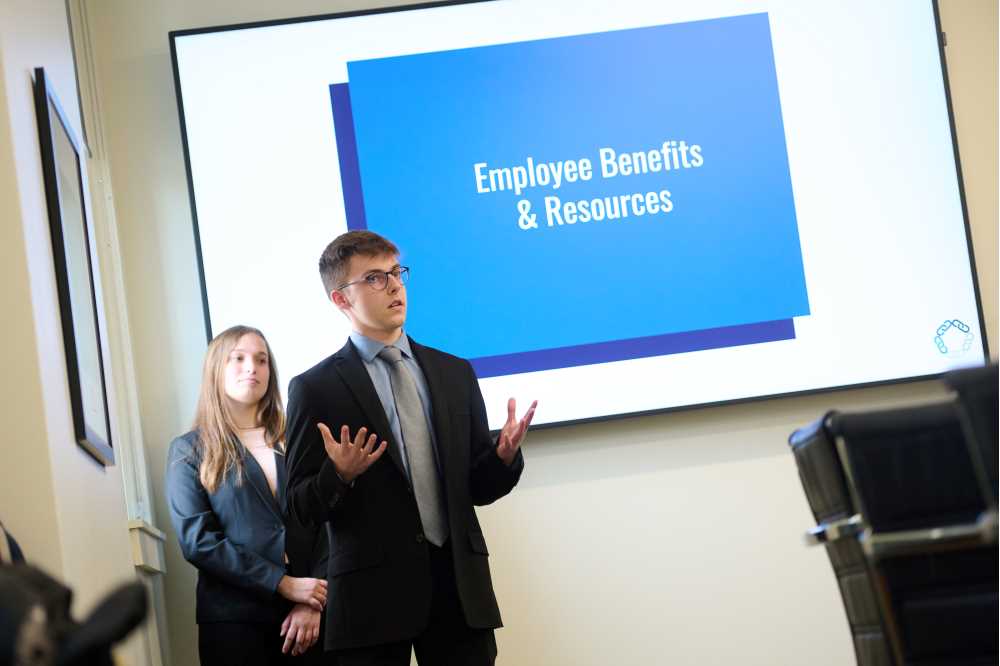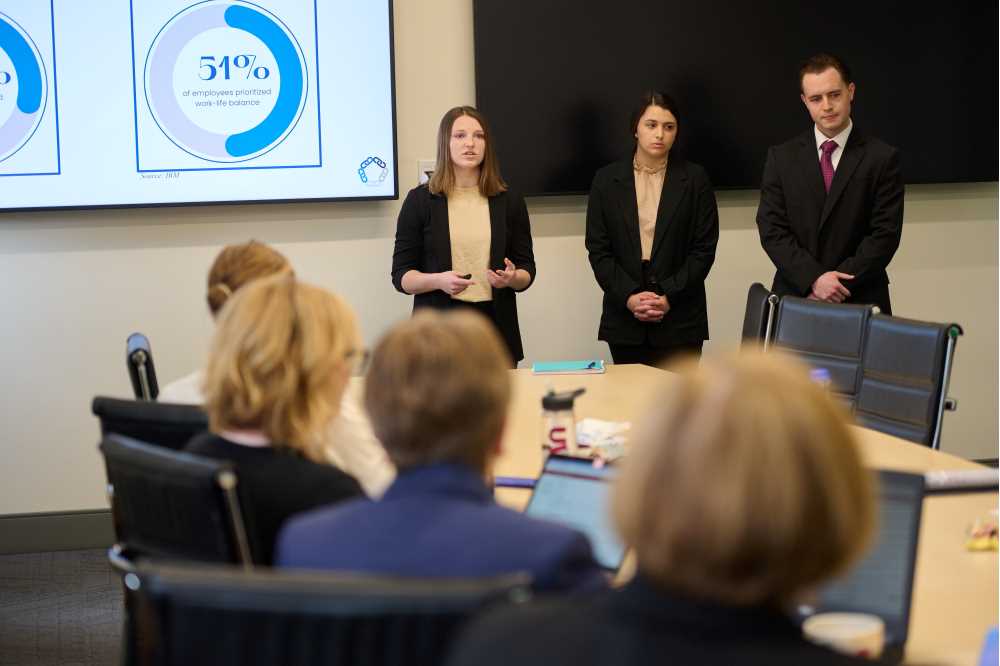
UW-La Crosse business students Claire Mistele (left) and Jackson Lescamela detail ways that Kwik Trip can design a work environment for the attraction and retention of new employees. The presentation was part of the Kwik Trip Integrated Core Program at UWL.
Solving real-world problems for one of Wisconsin’s most recognizable companies.
That kind of work is typically left to seasoned professionals. However, thanks to the Kwik Trip Integrated Core Program at UW-La Crosse, business students are gaining those experiences, too.
During the spring semester, students worked in groups to research and address two issues currently facing the La Crosse-based convenience store company. Half the students explored strategies to design a work environment for the attraction and retention of new employees. The other half studied ways to maintain culture and retain workers in a hybrid environment.
In early May, they presented their findings to representatives from Kwik Trip.
Incoming senior Jack Murphy — who worked with Alissa St. Louis, Teagan Hammen, Jackson Lescamela and Claire Mistele to tackle the first research topic — says the group put considerable effort into crafting the presentation.
“This report was conducted by analyzing and researching various information to gain insight on what Kwik Trip can put in place to create and support a work environment that enhances employment brands and leads to more in-person work,” explains Murphy, a finance major. “This project was made primarily for the Kwik Trip team but could be used in almost any business practice.”
Murphy notes that, in large part due to COVID-19, many employers are reevaluating the traditional workplace. In that way, the pandemic provided businesses an opportunity to explore new ideas benefitting both the organization and its employees.
“We are in a fast-changing world where traditional aspects of the office may not be attractive for employees entering the workforce,” Murphy says. “Especially with the recent pandemic forcing people to work from home, the possibilities of workplace environments have expanded. Employees also want an employer that cares for their needs and wants.”

From left to right: UWL students Alissa St. Louis, Teagan Hammen and Jack Murphy share their research findings with representatives from Kwik Trip. Recommendations included increased benefits and resources, such as employer-sponsored childcare, and more flexible scheduling policies.
Job satisfaction and employee well-being were constant factors throughout the students’ project.
Recommendations for employers included:
- Benefits and resources such as employer-sponsored childcare, on-site gyms and mental health resources
- More flexible scheduling policies and social events designed to improve employee cohesion
- Potential changes to the physical workplace, including open vs. closed workspaces.
St. Louis, an incoming junior majoring in accounting, says the project — and the Kwik Trip Integrated Core Program in general — has provided an invaluable opportunity to gain experience in the business world. More than a conventional class, the program has also sparked close and collaborative relationships among students.
“This program is preparing me for my career because it offers many real-world problems that my team must solve,” St. Louis notes. “In many classes, it is hard to connect the content with how it would be applied in the workplace. In this program, the problems that we were asked to solve connected the course work and what people are trying to solve every day at work.”
All this work results in much more than a grade on a transcript.
Kwik Trip representatives who attended the presentations say they went in with open minds, eager to hear and consider the students’ ideas.
They see today’s business students — and their thoughts on how businesses can adapt and improve — as key to the future.
“The Kwik Trip Integrated Core students’ efforts and dedication were irrefutable,” says Megan Harcey, director of recruiting and coworker experience at Kwik Trip. “Their ability to take complex abstract concepts, research legitimate recommendations and simulate it into professional business presentations was truly impressive. We admire their passion and dedication, and there is no doubt this rigorous program has better prepared them for their bright futures.”
Written by UW-La Crosse
Link to original story: https://www.uwlax.edu/news/posts/real-problems-real-solutions/
